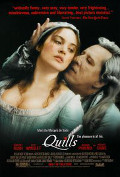
Directed by
Phillip Kaufman
124 minutes
Rated M
Reviewed by
Bernard Hemingway

Quills
Synopsis: In the wake of the French Revolution, the Marquis de Sade (Geoffrey Rush) has been committed to an insane asylum. He manages to smuggle his writings out of jail with the help of a laundress, Madeleine (Kate Winslet). When Napoleon, outraged by the pornographer's infamy, sends Dr Royer-Collard (Michael Caine) to cure him of his depravity, de Sade begins to play a deadly game.The name of 18th century author, Marquis de Sade, is synonymous in modern popular culture with sexual depravity. Not that anyone actually knows his works. On the strength of what is read out here as his writings, there's not a lot of reason to do so - it's pretty basic stuff involving various forms of penetration. What is widely overlooked in (usually humorous) pop cultural references however is de Sade's association of violence with sexual gratification (hence the clinical meaning of sadism). Not nice stuff. So his writings raise issues of censorship. They did in his day and they do today. These issues are raised in Quills although they remain embedded in the narrative, itself carrying the final message that censorship has worse outcomes that what it represses (and, that, at the end of the day, morality is a matter of circumstance).
The fine script is by Doug Wright from his own play, so presumably it remains close to the original text. However I can imagine this being more potent in a theatrical context, where the attention is more closely focussed on ideas carried forth by the particular characterological interaction. Precisely because Kaufman is such a superb visual artist and the cinematography and production design is of such high quality those ideas and their delivery tend to get swamped by cinematic concerns. The net effect is that you know you've seen a very slick film and there were things in it which should have moved you, but you're not really sure you care that much. For this film lacks two things - atmosphere and drama.
In the first instance, there is little sense of what must have been the abominable conditions of an 18th century bedlam as say One Flew Over The Cukoo's Nest told us about the conditions of its late 20th century equivalent. The loonies cavort in a manicured gardens, the linen is changed regularly and de Sade eats gourmet meals. Of course, with these kinds of historical films, all credit goes to directors who do not reproduce stock scenes of the horrors of by-gone ways. Kaufman is commendably restrained in this respect but it's all a little too salubrious.
In the second instance although individually each performance is excellent, Rush doing a fine job in a role which we can probably be thankful did not go to John Malkovich, and Michael Caine a scene-stealer as the sadist avant la lettre, Roymer-Coullard, there is smoke here but no real fire. (Two interesting cameos are Billie Whitelaw as Madeleine's blind mother and Edward Tudor Pole, who sang Who Killed Bambi? in The Great Rock N'Roll Swindle, as one of the inmates). Joaquin Phoenix, as the asylum's idealistic governor, Abbé Coulmier, is really the only actor who brings any internal conflict or palpable vulnerability to his character. And his is thus the only character who evolves over the course of the fairly long two hours, the other three principals remaining quite static. Even de Sade's own descent into a physical and mental hell produces little evident change in his foppishly defiant character. And when the subject matter is so limited, as it is here, despite its formal brilliance, this, unfortunate to say, leaves more than a little to be desired.

Want more about this film?


Want something different?




